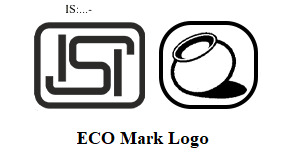The Ecomark scheme was first launched in 1991 to encourage consumers to buy products having less harmful impact. It is a voluntary mark labelling consumer product as environment-friendly based on specific quality and environmental parameters.
However an indifferent attitude shown by a majority of political leaders of that decade, and major focus was towards globalisation it was conceivably one of the major reasons for the failure of the Ecomark Scheme that facilitated the sustainable management of resources.
Ecomark Certification Rules is for labelling of products which will have lesser adverse impacts on the environment to encourage consumers to adopt such products and manufacturers and consciously transition from non-ecofriendly to environmental friendly products.
The Ministry of Environment, Forest, and Climate Change of the Government of India has taken a significant step towards promoting sustainability and environment friendly consumption patterns with the introduction of the Eco mark Certification Rules, 2023. This draft notification, designed to encourage the adoption of eco-friendly products and the development of eco-conscious manufacturing processes, supersedes the earlier notification of 1991.
Key objectives of the notification:
- Encouraging mindful consumption: The rules aim to create awareness among consumers about the issues accruing due to mindless consumerism and encourage thoughtful and sustainable consumption patterns.
- Incentivizing Manufacturers- The provision is crafted to incentivise the manufacturing sector to make a transition towards developing products with environmental friendly products with life cycle assessment per the protocols.
- Avoid Greenwashing: The standardisation of this mark will sieve down possibilities of misrepresentation in terms of labelling of their products as eco friendly or sustainably sourced, while the reality could not be entirely true.
Application:
Application to any product which is produced or supplied for distribution or use in the market.
The criteria for Ecomark Labelling shall be as follows:
- Environmental criteria for each product/product category under the Ecomark Rules shall be notified by Central Government
- Certification of Standards Body (national or international) for quality and safety or mandates of Quality Control Orders in a pre-requisite Ecomark
- Production or process including source of raw material
- Use of natural resources
- Likely impact is there on Environment
- Effect and extent of emissions/waste arising from production process
- Disposal of product and its packaging
- Compliance to Extended Producer Responsibility Regulations
- Utilisation of waste and recycled materials
- Suitability to recycling
- Substitution of hazardous substances with safer ones
Implementation mechanism:
The Governance of Ecomark Rules is vested with a steering committee which comprises of representatives from concerned ministries/departments, domain experts, representatives from industry associations, consumer groups and other relevant stakeholders. Functions of steering committee are as follows:
-
- Grant approvals for
- Framework for institutionalising Ecomark Rules.
- Initiatives to incentivise Ecomark certified business operators.
- Notify product/ product categories to be included in Ecomark Rules on recommendations of Ecomark Administrator.
- Recognition of domestic and international voluntary ecolabelling programs.
- Strategies for promotion and future development of Ecomark Rules.
- Make recommendations to Central Government
- Determine product/product category to be included in Ecomark Rules.
- Inclusion of Ecomark products in public procurement under GeM portal.
- Allocation of resources for implementation of Ecomark Rules.
- Measures for adoption of Ecomark.
- Review and monitoring of implementation of Ecomark Administrator:
- Grant approvals for
Central Pollution Control Board (CPCB) is responsible for implementation of the Ecomark Rules.
Responsibilities of Ecomark Administrator are:
-
-
- Develop guidelines for:
- Framework for institutionalising Ecomark Rules
- Development of Ecomark Web Portal and Knowledge/Database platform
- Designation of Ecomark verifiers
- Appointing third parties for carrying out market surveillance activities
- For fixing fees to be charged by designated Ecomark verifiers
- Identify products to be covered under Ecomark Rules
- Constitute technical committees for different products under Ecomark Rules, develop scientific criteria that a product shall comply to be certified under Ecomark Rules
- Review Domestic and International criteria and standards
- Develop initiatives to incentivise Ecomark Verifiers, third party for market surveillance, audit and third party on Ecomark web portal
- Register and empanel Designated Ecomark Verifiers, third party for market surveillance, audit and third party on Ecomark web portal
- Review Ecomark criteria as per technology development and market evolution
- Compile and/or Assess annual reports submitted by all the Ecomark or other recognized eco label entities
- Assess International Eco labelling programs, for mutual recognition
- Direct Ecomark Certification holders to pay compensation in case of non-compliance
- Develop guidelines for:
-
Designated Ecomark verifiers-
-
-
- Administrator (CPCB) or Designated Ecomark verifiers will verify compliance with ecolabelling criteria for the award/renewal of certificate to products under Ecomark Rules.
- Designated Ecomark Verifiers shall be accredited entities
- Undertake conformity assessment including visiting factory, drawing samples, audit of factory, recommending for award/ renewal of certification.
-
Considering the changing trends and consumer demand meandering towards environment friendly products, it is a welcome move made by the Government of India that will facilitate healthy competition in the manufacturing sector fostering sustainable economics. However, this standard does have a challenge of defining specifications against which the eco friendliness can be measured against the variety of products. It would be interesting to see how Government is going to overcome this challenge and bring out a Specification and Testing mechanisms catering to the demand of this Labelling.



